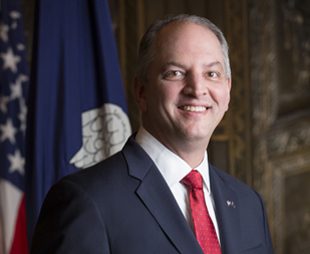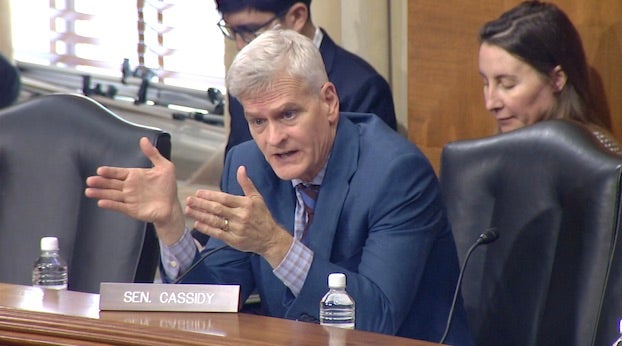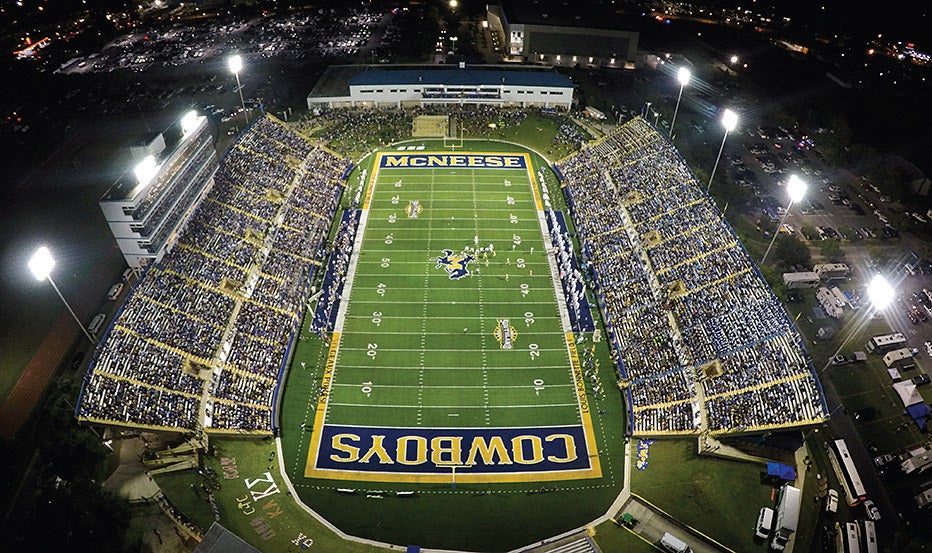Laura Aftermath: Edwards still trying to acquire funding
Published 5:00 am Thursday, December 16, 2021
Gov. John Bel Edwards told a crowd of state legislators and local officials who gathered in Lake Charles Wednesday that he hasn’t given up trying to secure more federal dollars to aid with long-term recovery from Hurricanes Laura and Delta.
During the 16th annual Legis-Gator event at L’Auberge Casino Resort, Edwards said another bite at the apple could come with the next appropriation instrument to come before Congress in early 2022. He said he expects to have a permanent housing program underway and adequately funded in time for next year’s event.
Congress setting aside $595 million in Community Development Block Grant-Disaster Recovery funding in October to aid in housing recovery is a good start, but it’s far short of reaching the more than $1 billion in unmet housing needs stemming from the 2020 storms, Edwards said. Twenty percent of the CDBG funding is already set aside for mitigation efforts.
Trending
“We can all acknowledge there were pieces of (hurricane) recovery that were good … but it’s really hard to talk about those parts that may have gone better than others when people are still upside down in their lives,” he said. “That’s because they don’t have the housing that they need so many months later.”
Edwards said Lake Charles had a housing shortage before Hurricanes Laura and Delta because the unemployment rate was the lowest in the nation for a city its size. The governor and Lake Charles Mayor Nic Hunter announced in late November an $11.3 million housing rehabilitation program for residents impacted by Laura and Delta, as well as the May flood.
Edwards said an action plan has been drafted that covers Hurricanes Ida, Laura and Delta. He said a federal register notice is expected by mid-January that spells out the rules to deliver the $595 million in CDBG-DR assistance, after which the action plan will be submitted. Once it is approved, efforts with the long-term housing program will begin, he said.
“Obviously, we’ve got a long way to go,” he said.
This year’s Legis-Gator was held in person, with last year’s event held virtually because of the COVID-19 pandemic. Edwards acknowledged the hardships from the pandemic, along with the five hurricanes that hit Louisiana over the last two hurricane seasons.
“It has been a tough period, but the people of Louisiana are even tougher,” he said. “That doesn’t mean they’re not tired.”
Trending
Louisiana’s current COVID-19 case numbers are the best at any point in the pandemic, with roughly 200 people hospitalized and a 2.1 percent positive test rate, Edwards said. In August, there were 3,200 people hospitalized, with a 19 percent positive test rate.
Edwards said Louisiana will continue to produce and refine oil and gas from the Gulf of Mexico. He spoke of continued exploration in the Gulf as the state makes its transition to a cleaner, lower-carbon footprint.
The governor also spoke of efforts to expand broadband connectivity within the state and end the digital divide by 2029. He also discussed the upcoming redistricting special legislative session in early February.
Louisiana Department of Transportation and Development Secretary Shawn Wilson said the new Interstate 10-Calcasieu River bridge project could break ground before 2024. It could take four to five years to construct the bridge portion from I-210 on the west side, to Ryan Street on the river’s east side.
Wilson acknowledged the existing I-10 bridge is old and unattractive. Still, he said it is safe, and it is the only bridge he uses when heading to Texas.
Wilson mentioned efforts to fund a new I-10 bridge, including more than $80 million in state capital outlay dollars allocated by Edwards last year. Since then, that amount has been doubled from Congress, Wilson said. More funding opportunities for the project are available through the recently-approved Infrastructure Investment and Jobs Act.
“Whether or not we can fund it in total is always the question,” he said.
Work on the environmental impact statement for the I-10 bridge project is nearing its end, with a final document expected to be ready early next year, Wilson said.
U.S. Sens. John Kennedy and Bill Cassidy, R-La., both sent taped statements from Washington D.C. Kennedy said he amended legislation to allow the state to invest unspent COVID-19 relief funds to help disaster victims and improve infrastructure. The measure passed in the Senate and is awaiting House passage.
Kennedy spoke out against President Joe Biden’s “war on the oil and gas and petrochemical industries,” saying it will raise the cost of fuel and heating.
Cassidy spoke of the “pent up demands” for infrastructure in Louisiana that are addressed in the Infrastructure Investment and Jobs Act.
U.S. Rep. Clay Higgins, R-Port Barre, did not attend the Legis-Gator event, saying in a press release that he is recovering after undergoing a “successful surgical procedure” Tuesday at Our Lady of Lourdes in Lafayette. The surgery was related to him aggravating an existing internal injury while exercising earlier this year.
Lt. Gov. Billy Nungesser said on New Year’s Day, Louisiana will have a float in the upcoming Rose Bowl parade. He mentioned Volunteer Louisiana with 10,000 residents signed up and 34 nonprofits partnered helping residents impacted by hurricanes. For more, visit volunteerlouisiana.gov.
“We will be on the ground until every family is back in their home.
Former state Sen. Ronnie Johns, R-Sulphur, received this year’s Legis-Gator of the Year Award. Johns stepped down from his Senate seat earlier this year to take over as chairman of the Louisiana Gaming Control Board.
Sen. Mark Abraham, R-Lake Charles, and Rep. Troy Romero, R-Jennings, received the Governmental Affairs Award.
Speaker of the House Clay Schexnayder, R-Gonzales, and Senate President Page Cortez, R-Lafayette, received the Southwest Louisiana Chair Award.
The Chamber Southwest Louisiana hosted the Legis-Gator event.






